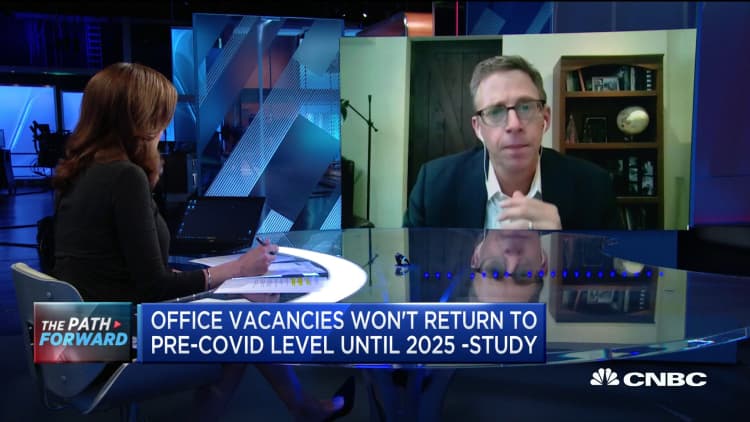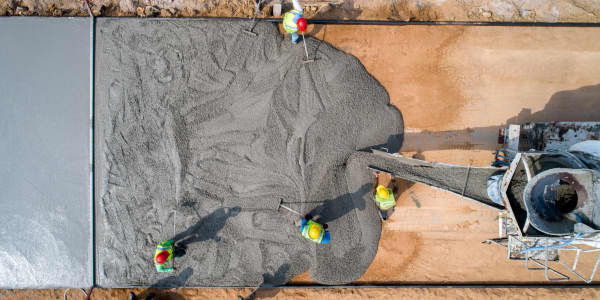
The coronavirus remote work experiment will become a permanent trend, but at some point, employees will return to the office in numbers that match the past. When? It could take five years, according to a new forecast from Cushman & Wakefield.
Global office vacancies will not return to their pre-Covid peak levels until 2025 and, in all, a net 215 million square feet of office vacancy will have been lost due to the pandemic, according to the outlook from one of the largest real estate services firms in the world. Between Q2 2020, when Covid-19 hit the U.S., and Q3 2021, the net negative office square feet damage will reach 95 million square feet, roughly 10 million square feet more than the financial crisis trough.
The situation will be the worst in the West. During the financial crisis, Canada, Europe and the U.S. recorded a combined loss of 120.5 million of square feet occupancy from peak-to-trough. Including Q2 2020, that will reach over 200 million square feet of "negative absorption" peak-to-trough in the Covid recession, according to Cushman & Wakefield's analysis.
Work from home is 'very real'
"We know this work from home trend is very real," Kevin Thorpe, the firm's chief economist, recently told CNBC.
For the study, Cushman & Wakefield surveyed some of largest companies around the world about the future of the office, and attempted to measure both the cyclical impacts of the Covid recession and structural impacts assuming a higher increase in work from home.
Thorpe said two key findings emerged. First, office leasing fundamentals will be significantly impacted and vacancies reach an all-time high. But the second find is more encouraging: the office real estate market will fully recover, according to Cushman & Wakefield, largely due to employment growth and the ongoing shift in the U.S. economy's concentration in certain types of professional jobs.
In all, the real estate firm estimates that 82% of the damage will be related to cyclical factors: permanent office job losses and the rise of coworking, while 18% is related to structural factors: primarily assumptions about permanent remote workers and hybrid workers — those who work remotely some of the time.
Work from home will double, and hybrid workers will increase. The study estimates that the share of people working permanently from home in the U.S. and Europe will increase from roughly 5-6% pre-Covid-19 to between 10% and 11% post-Covid, while the share of hybrid — also referred to as agile workers — will increase from between 32% to 36% to just under half of all workers.
Levi Strauss & Co. CFO Harmit Singh recently told a CNBC @Work virtual event that it pulled the plug on any new commercial real estate during the crisis. "The myth that work from home is not productive has been busted," the Levi Strauss CFO said. "I believe we will settle into a culture where working from anywhere will be the new norm, with work from home or office or a hybrid arrangement."
Google recently announced it will try a hybrid model of work as most of its employees do not want to be in the office every day.
Many younger workers are taking advantage of the Covid remote working shift to travel, embracing a "digital nomadic" lifestyle, a shift which could become permanent for a new generation of labor.
Over time, as economy shifts to a knowledge-based, professional services economy, it will offset the flexible workforce trend, Cushman & Wakefield's study concludes. "But in the near-term, there will be significant challenges for the office sector," Thorpe said.
Many workers still do not feel safe enough to return to office. One study found that only 14% of workers said that they trust their CEOs and senior managers to safely lead them back to work.
Global office vacancy will rise from 10.9% pre-Covid crisis to 15.6% by Q2 2022, the study forecasts.
Some of the largest companies in the world have been expanding office space in major cities, such as New York, during the crisis.
Facebook, which has been acquiring New York real estate for years, agreed last month to a major lease at the old James A. Farley post office building in Manhattan. Amazon has also purchased the Lord & Taylor building on 5th Avenue, and that is even though Facebook CEO Mark Zuckerberg has said as much as half of the company's workers may be remote in the future. In March, just as the Covid crisis hit the U.S., Amazon paid over $1 billion to acquire tha Lord & Taylor building in New York, which includes over 600,000 square feet of space.






